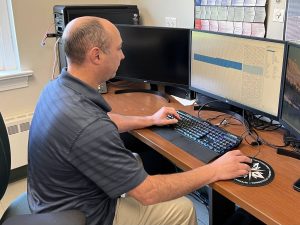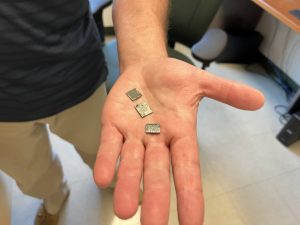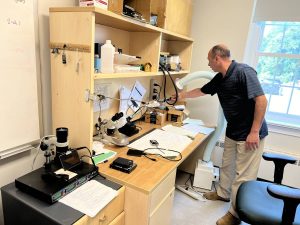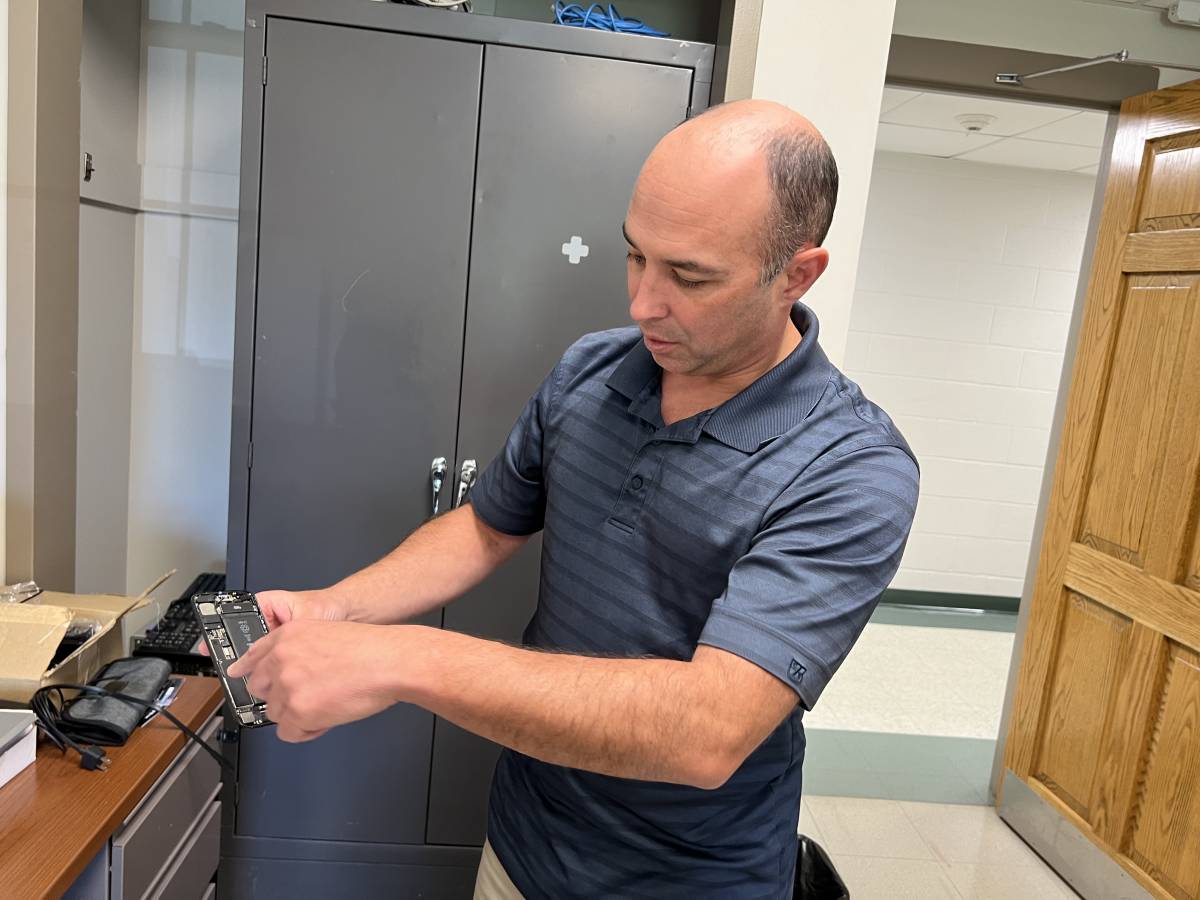Monroe Police Detective Michael Chaves, a longtime computer forensics examiner, is retiring after 20 years. His expertise examining cellphones, computers and other electronic devices played a major role in the arrests of child molesters, white collar criminals and other offenders preying on victims in Monroe and beyond.
“Early on, the department realized that Michael possessed special skills and talents that would be valuable for police electronic investigations,” Chief Keith White said. “His exceptional skills became well-known throughout the region and other local police departments, state agencies, and federal partners frequently sought him out. Michael was a highly regarded detective, and his departure will be felt. I wish him the best in his future endeavors.”
Chaves had served in the U.S. Marines for five years and his military time counts toward his retirement. His last day is Aug. 26.
He grew up in Monroe and graduated from Masuk High School in 1995. After serving in the Marines, he enrolled at Sacred Heart University and took computer science. It was at SHU that he read about the field of computer forensics.
“I like the puzzle work. The cat and mouse chase — trying to figure something out, something someone wants to hide,” Chaves said during a recent interview. “Someone’s trying to mask their activity and you’re trying to figure it out at the same time.”
“I like to know the how and the why,” he added. “I just like to know that stuff. I know how it works, but why does it work?”

After graduating from Sacred Heart in 2003, he applied for jobs at the Internal Revenue Service and the Monroe Police Department, where he was hired in 2004. The IRS later wanted to hire him, but by then Chaves said he had his heart set on police work.
He was promoted to the Detective Division in 2009, where he remained for the rest of his career.
Chaves reflected on his decision to pursue a career in law enforcement, rather than opting for a higher paying job at the federal level or in the private sector.
“You do it because it has meaning,” he said of police work. “If there’s a crime against a person and you’re able to use your skills to solve that crime, I get more satisfaction out of it than a bigger paycheck could get me. I never took a promotion. I was extremely happy and satisfied doing what I was doing, and I was good at it.”
Aside from being a detective at the Monroe Police Department, Chaves had taught cybersecurity at Sacred Heart as an adjunct professor for 10 years. “I developed the computer forensics and cellphone forensics classes,” he said.
Digital breadcrumbs
In computer forensics, Chaves said investigators must keep up with the constant changes in technology.
During his investigations, he has cleared people of accusations of wrong doing, as well as found evidence of guilt. “You have to be as unbiased as you can,” he said. “As an investigator, you’re independent. The less amount I know about a case, the less biased I can be.”
Chaves said everyone’s lives are recorded in different ways, from cellphones synching to cars and gps tracking people’s whereabouts, to video surveillance in stores and on highways.
“There’s a recording of you somewhere,” he said. “In today’s world, unless you’re totally off the grid, you’re leaving some sort of breadcrumb behind. There’s no crime out there today without some digital element.”

Inside the forensic lab of the Monroe Police Department, officers have tools to open cellphones and retrieve memory chips storing the data.
When a computer file is deleted, if it is not overwritten, it still exists on the hard drive. Police have a write blocker, an attachment that prevents officers from accidentally overwriting data on a suspect’s computer hard drive, while conducting an investigation.
Police use the device to take all the data from the computer’s hard drive.
Sometimes people try to change file names to deter law enforcement from opening incriminating data. For instance, a child pornographer may change “jpeg” to “DLL”. Chaves said police have tools that analyze the file header against the extension.
“It will say it doesn’t match and should be a jpeg,” he explained.
Detectives also have tools that can break passwords in as little as a few seconds, though Chaves said it can sometimes take months, years or never be breeched. “It depends on the encryption value used,” he said.
If someone uses an unidentifiable email to harass a victim, Chaves said internet providers in the U.S. are cooperative with police who have a warrant and will reveal the suspect’s identity. However, he said dealing with outside countries can be extremely difficult.
Self incrimination
Chaves said some criminals are sophisticated, though many are not. “They’ll snap a phone in half or delete a photo and think we can’t get it,” he said.
Chaves remembers examining a Blackberry phone of a bank robbery suspect for another town’s police department and finding evidence of yet another crime.
Aside from evidence of the bank robbery, Chaves recovered a photo of cigarettes in a storage facility. He gave the police department the date and timestamp and officers found a convenience store was burglarized at that time and cigarettes were taken.
During the burglary, the thief decided to stop and snap an incriminating photo of the merchandise.
Making a federal case

Chaves’ most memorable case led to the arrest and conviction of a child sex offender. In 2011, he was tracking down child pornography transactions as part of an Internet Crimes Against Children investigation initially thought to be in the Monroe area.
The case was eventually turned over to Newtown police and their execution of a search warrant led to the recovery of VHS tapes and computer evidence from suspect, David Csanadi’s home.
The computer evidence was given to Chaves for his analysis.
“We located the files, a significant amount of child pornography and videos of him abusing a toddler,” Chaves recalled.
Because the abuse occurred across state lines, the FBI took over an aspect of the investigation. Csanadi was convicted on state and federal charges for producing child pornography. In 2013, he was sentenced to 20 years in prison.
“That was a good one, because he was a hands on offender,” Chaves said of the investigation. “Getting him off the streets was satisfying, because he couldn’t hurt another kid.”
Though he strives not to have any biases about a case, being married with children of his own, Chaves said, “you get more angry and frustrated” while investigating child molesters.
Catch of the Day
 A coffee mug on a table inside the Monroe Police Detective Division has binary numbers for Chaves’ badge number. It’s among the fond memories he has from working in town.
A coffee mug on a table inside the Monroe Police Detective Division has binary numbers for Chaves’ badge number. It’s among the fond memories he has from working in town.
He held up a printout of photos from a case he went on earlier in his career and smiled.
Monroe Fish Market had bought the former Swanson’s Fish Market building on Main Street. The purchase included the fish-shaped sign, but suddenly it was gone.
Chaves and Officer Michael Sweeney, now a lieutenant, investigated the theft.
The two officers learned the previous owners opened another market in Fairfield, then found the stolen sign there. It was turned over without the need for arrests.
The ride back was like coming home from a successful fishing trip. Chaves and Sweeney drove with the giant fish-shaped sign tied inside the open trunk of their Ford Crown Victoria Police Interceptor.
Chaves has a photo of the car, and another with he and Sweeney holding the sign up between them, as if showing off their big catch.
Chaves said he’ll miss the people he works with the most.
 When he was hired in 2004, John Salvatore was Monroe’s police chief.
When he was hired in 2004, John Salvatore was Monroe’s police chief.
“Chief Salvatore recognized early on the benefits and importance of having the ability to examine digital evidence as part investigating crimes and that continued with Chief White,” Chaves said.
“We have excellent leadership from the chief on down,” he said. “They hold their officers to the highest standards. We have a very low crime rate, because of the quality of the officers who work here.”
Monroe hires officers who have great life experiences, according to Chaves. “That’s one of the reasons why we have a good relationship with the community — and the respect goes both ways,” he said. “They respect us and we respect them.”
All respectful comments with the commenter’s first and last name are welcome.







Congratulations Detective. Thank you for your service my friend.